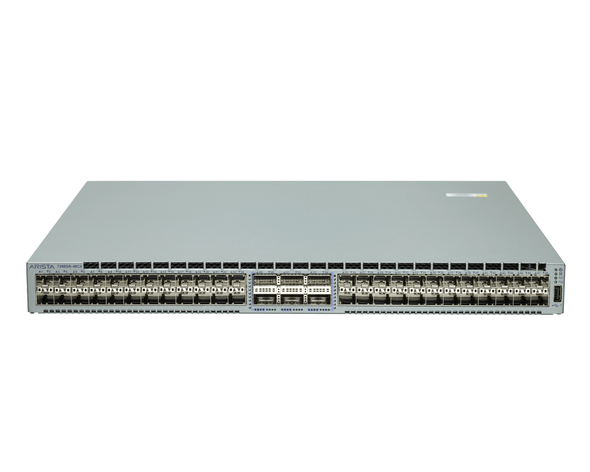Arista
Arista DCS-7050SX3-48YC12-F 48x 25GB SFP+ 12x 100GB QSFP F-B Airflow Switch
- MPN:
- DCS-7050SX3-48YC12-F
- Condition:
- Refurbished
- Shipping:
- Free Shipping
Frequently bought together:
Description
Arista DCS-7050SX3-48YC12-F 48x 25GB SFP+ 12x 100GB QSFP F-B Airflow Switch
- Condition : Seller refurbished
- Model: Arista DCS-7050SX3-48YC12-F
- Part Number : DCS-7050SX3-48YC12-F
-
- Series: Arista 7050X3 Series
- Form Factor: 1 RU (Rack Unit)
- Airflow Direction: Rear-to-Front airflow, indicated by the "-F" suffix.
Port Configuration:
- 48 x 1/10/25GbE SFP+ and SFP28 ports.
- Each port supports 1G, 10G, or 25G speeds.
- 12 x 40/100GbE QSFP+ or QSFP28 ports.
- Each QSFP+ port supports 40GbE or 100GbE speeds.
- Breakout options available for higher flexibility (e.g., 4 x 10GbE or 4 x 25GbE per QSFP+).
Performance:
- Switching Capacity: 4.8 Tbps (Terabits per second).
- Forwarding Rate: 2.4 Bpps (Billion packets per second).
- Latency: Ultra-low latency, as low as 800 nanoseconds for typical traffic.
Buffering:
- Packet Buffer: 32 MB of buffer memory, shared dynamically across ports to handle traffic bursts and avoid congestion.
Layer 2 Features:
- VLAN: Supports up to 4,096 VLANs with 802.1Q VLAN tagging.
- Link Aggregation: Supports LACP (Link Aggregation Control Protocol) with up to 64 groups and 16 ports per group.
- Spanning Tree Protocol: Includes STP, RSTP, and MSTP.
- Jumbo Frames: Supports jumbo frames up to 9216 bytes.
Layer 3 Features:
- Routing Protocols: OSPF, BGP, RIP, IS-IS, and static routing.
- IPv4/IPv6: Full support for IPv4 and IPv6 unicast and multicast routing.
- VRF: Virtual Routing and Forwarding, allowing multiple routing tables to coexist on the same switch.
- ECMP: Supports 128-way Equal-Cost Multi-Path (ECMP) routing for load balancing across multiple network paths.
Advanced Features:
- VXLAN: Hardware-based VXLAN support with VTEP (VXLAN Tunnel Endpoint) for Layer 2 overlay network extension.
- Quality of Service (QoS):
- Up to 8 egress queues per port.
- Support for priority queuing, traffic shaping, and scheduling for enhanced QoS control.
- Security:
- Access Control Lists (ACLs): Layer 2 to Layer 4 packet filtering.
- MACsec (802.1AE) encryption for secure data transmission.
- Control Plane Policing (CoPP) to protect the CPU from excessive traffic.
Management and Automation:
- Management Interfaces:
- 1 x 10/100/1000 Ethernet management port.
- 1 x RJ-45 console port.
- 1 x USB 2.0 port for external storage or configuration files.
- Operating System: Runs Arista Extensible Operating System (EOS), which provides advanced programmability, automation, and real-time network monitoring.
- eAPI: Provides programmatic access to switch configuration and state information using REST APIs.
- Zero Touch Provisioning (ZTP) for automated configuration upon startup.
- CloudVision: Integration with Arista's CloudVision platform for simplified network-wide automation and orchestration.
Telemetry:
- LANZ (Latency Analyzer): Provides real-time microburst detection and latency monitoring.
- sFlow: Supports real-time network monitoring for traffic analysis.
Power and Environmental:
- Power Supply: Dual hot-swappable, redundant power supplies.
- Typical Power Consumption: 310W (varies based on configuration and traffic).
- Cooling: Hot-swappable, redundant fans with rear-to-front airflow (as indicated by "-R").
Dimensions and Weight:
- Dimensions: 1.75 inches (4.45 cm) height x 19 inches (48.26 cm) width x 18 inches (45.7 cm) depth.
- Weight: Approximately 21.7 pounds (9.84 kg).
Key Features:
- High-Density 10/25/100GbE Ports: Supports up to 48 x 25GbE ports and 12 x 100GbE ports, making it ideal for high-density data center and cloud environments.
- Low Latency: Designed for ultra-low latency, making it suitable for environments like high-performance computing (HPC), financial services, and large-scale enterprise networks.
- Programmability and Automation: EOS provides extensive automation tools and APIs, making it easier to manage large-scale networks with minimal manual intervention.
Use Cases:
- Data Center Leaf/Spine Architectures: Ideal for deployment in high-density data center leaf/spine topologies, offering scalable connectivity for compute and storage systems.
- Enterprise Core and Aggregation: Suitable for enterprise networks requiring advanced Layer 2 and Layer 3 features with high throughput and low latency.













